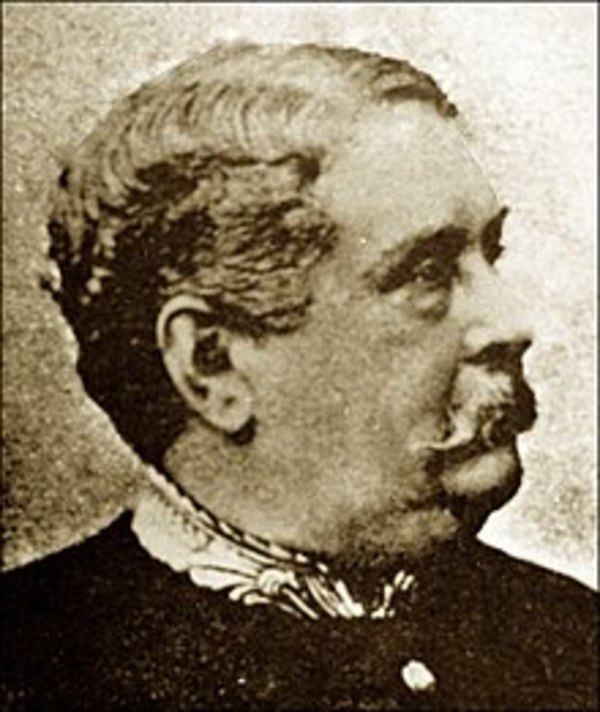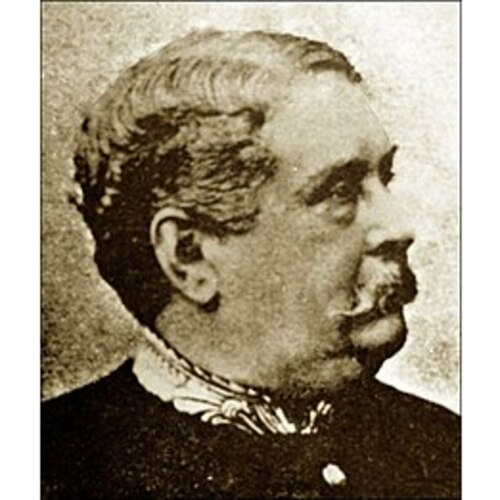
Source: Courtesy of Wikimedia Commons
O’BRIEN, Sir JOHN TERENCE NICHOLLS, governor of Newfoundland; b. 23 April 1830 in Guernsey, elder son of Terence O’Brien and Catherine Collins; m. first 1853 Philippa Leeds Eastgate (d. 1867) in Darjeeling, India, and they had three sons; m. secondly 1880 Victoria Fane, née Temple; they had no children; d. 23 Feb. 1903 in London, England.
Born into an Indian army family, Terence O’Brien was educated at the Royal Military College in Sandhurst, England. In 1849 he sailed for India, where he qualified in native languages and became a surveyor and engineer. He saw service during the mutiny, and in 1861 went to Ceylon as assistant military secretary to his father. After two years there and four years as a brigade major in the Bengal army, in 1867 he returned to England on half pay. Almost immediately he accepted the post of inspector general of police on Mauritius. In 1881 he became governor of Heligoland (Germany) and seven years later he accepted a transfer to Newfoundland. He arrived in St John’s in mid January 1889.
Sir Terence, as he had been since 1887, was not an ideal choice for the governorship. Newfoundland was beset with economic and diplomatic problems, and its politics were complex. The situation called for a tactful, supple governor who understood the workings of responsible government. Instead, the colony received an ex-army officer with little relevant experience. Although well meaning, honourable, and conscientious, O’Brien simply did not have the political and diplomatic skills the position demanded. Throughout his six-year governorship, there was a tension between what he considered proper and what his ministers considered expedient. “I’d like to shake them up,” he wrote, “and put a little public spirit instead of codfish into them.”
An early example of his political clumsiness followed the November 1889 election. The defeated government of Sir Robert Thorburn decided to stay in power until the end. of the year. Instead of acting on his ministers’ advice and accepting an unpalatable situation, O’Brien imposed limits on the government’s freedom of action and insisted that the incoming premier, Sir William Vallance Whiteway, have a voice in the allocation of jobs on the Newfoundland railway. His intervention upset both politicians.
O’Brien subsequently presided over five of Newfoundland’s most tumultuous years. It was a roller-coaster ride, during which his instinctive contempt for colonial politicians became more pronounced, and his frustration at not being able to influence events significantly gave rise to outbursts of temper and tactless lectures to the cabinet. He was angered by the government’s refusal to do what was required of it regarding the French Shore question [see Whiteway], disgusted by the patronage that riddled the colony’s public life, and outraged by the persistent criticism of the imperial government. In 1891 he had to be restrained from dismissing Robert Bond*, a strident critic of the Colonial Office, from the cabinet and precipitating a major crisis. Late the next year he was applying for a transfer, but being over 60, he could not be considered for another governorship. He had to stay on in what he called “a Trans Atlantic Ireland of a lower type.”
Whiteway won the 1893 election, but the Tories counter-attacked by filing petitions against 17 Liberals alleging corrupt practice. When it became clear that the petitions would succeed, O’Brien refused to consider Whiteway’s request that he approve either legislation to indemnify those elected or a dissolution. Guided by Alpheus Todd*’s Parliamentary government in the British colonies (London, 1880), which saw the governor as the “safeguard against all abuse of power,” O’Brien regarded the election trials as a splendid way to cleanse the Augean stables of Newfoundland public life. In so doing, he adopted a partisan position and exacerbated an already difficult situation. Whiteway resigned in April 1894, and O’Brien approved a minority Tory administration, which he allowed to stay in power after the expiry of supply legislation. It was better to collect revenue without legal authority, he thought, than “to recall to my Councils these men branded with corruption, smarting from defeat.” The Liberals regained their majority after by-elections that fall. The Tories hung on, but finally resigned amid the wreckage of the bank crash in December [see James Goodfellow*]. O’Brien now faced the prospect of a Liberal government. Desperate, he lent his support to petitions calling on the imperial government to intervene. “Now or never is the time for England to step in and wipe out the disgrace of this place under responsible government,” he wrote.
But London preferred to let events take their course. O’Brien was instructed early in 1895 to assent to a bill allowing those unseated in the election trials to resume their places in the assembly after by-elections. He was humiliated and outraged. The Colonial Office, he thought, had “entirely gone back on themselves and on me . . . . I have not worn H.M.’s uniform for 48 years to have it contaminated now by Whiteway’s corruption.” Though he sent in his resignation, he had to stay in St John’s until late July. By 8 February Whiteway had resumed the premiership, with a cabinet which, the governor snorted, “can reflect as little credit on this portion of our Colonial Empire as it does on its unfortunate Governor whose duty alone compels him to submit to this degrading association.” O’Brien would have liked another post, and certainly thought he deserved one, but, as John Anderson of the Colonial Office noted, “he has no administrative ability such as is necessary for a . . . Crown Colony.” He returned to London, where he died eight years later.
Always the soldier, Sir Terence saw himself as a servant of the imperial government whose primary duty was to persuade the colonial administration to do what London wanted. Resistance and criticism he tended to equate with disloyalty, and he rarely attempted to represent the colonial viewpoint. Instead, he fed the Colonial Office and his friends a stream of vituperative dispatches and letters that must have helped entrench the view that Newfoundland politicians were uniquely corrupt, devious, venal, and incompetent. His interventions in local politics were for the most part unfortunate. Certainly, his actions in 1894 helped to create the instability that precipitated the bank crash. Used to the clear power relationships of the army and the raj, O’Brien could not adapt to the complexities of responsible government in Newfoundland. A man of admirable personal qualities, whose efforts to relieve the distress which followed the great fire in St John’s in 1892 and the bank crash were much appreciated, he was nevertheless unsuited to the Newfoundland of the 1890s.
[Some information concerning Sir John Terence Nicholls O’Brien was provided to the author by Major T. L. Gossage of Sway, Eng., in his letter and enclosures of 11 Feb. 1990. j.k.h.]
British Library (London), Add. ms 43556 (Ripon papers): 135, 155. PRO, CO 194/213: 245–46; 194/214: 91; 194/218: 344; 194/224: 489; 194/228: 128; 194/231: 320–21; 194/233: 429. Yale Univ. Library, Medical Library (New Haven, Conn.), Wilfred Grenfell papers, O’Brien to Grenfell, 22 Dec. 1894, 7 Feb. 1895. Evening Mercury (St John’s), 18 Jan. 1889. Evening Telegram (St John’s), 26–27 Feb. 1903. G.B., Colonial Office, The Colonial Office list . . . (London), 1890: 453. Hiller, “Hist. of Nfld,” 187–89, 230, cc.6–7. H[arvey] Mitchell, “The constitutional crisis of 1889 in Newfoundland,” Canadian Journal of Economics and Political Science (Toronto), 24 (1958): 323–31. Who was who, 1897–1915 (1988).
Cite This Article
J. K. Hiller, “O’BRIEN, Sir JOHN TERENCE NICHOLLS,” in Dictionary of Canadian Biography, vol. 13, University of Toronto/Université Laval, 2003–, accessed March 1, 2026, https://www.biographi.ca/en/bio/o_brien_john_terence_nicholls_13E.html.
The citation above shows the format for footnotes and endnotes according to the Chicago manual of style (16th edition). Information to be used in other citation formats:
| Permalink: | https://www.biographi.ca/en/bio/o_brien_john_terence_nicholls_13E.html |
| Author of Article: | J. K. Hiller |
| Title of Article: | O’BRIEN, Sir JOHN TERENCE NICHOLLS |
| Publication Name: | Dictionary of Canadian Biography, vol. 13 |
| Publisher: | University of Toronto/Université Laval |
| Year of publication: | 1994 |
| Year of revision: | 1994 |
| Access Date: | March 1, 2026 |



